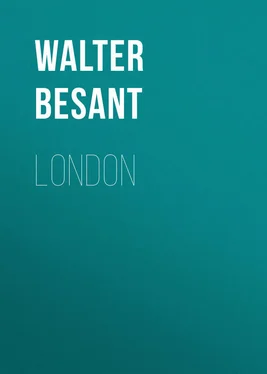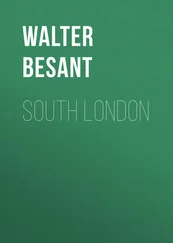Walter Besant - London
Здесь есть возможность читать онлайн «Walter Besant - London» — ознакомительный отрывок электронной книги совершенно бесплатно, а после прочтения отрывка купить полную версию. В некоторых случаях можно слушать аудио, скачать через торрент в формате fb2 и присутствует краткое содержание. Жанр: foreign_antique, foreign_prose, на английском языке. Описание произведения, (предисловие) а так же отзывы посетителей доступны на портале библиотеки ЛибКат.
- Название:London
- Автор:
- Жанр:
- Год:неизвестен
- ISBN:нет данных
- Рейтинг книги:4 / 5. Голосов: 1
-
Избранное:Добавить в избранное
- Отзывы:
-
Ваша оценка:
- 80
- 1
- 2
- 3
- 4
- 5
London: краткое содержание, описание и аннотация
Предлагаем к чтению аннотацию, описание, краткое содержание или предисловие (зависит от того, что написал сам автор книги «London»). Если вы не нашли необходимую информацию о книге — напишите в комментариях, мы постараемся отыскать её.
London — читать онлайн ознакомительный отрывок
Ниже представлен текст книги, разбитый по страницам. Система сохранения места последней прочитанной страницы, позволяет с удобством читать онлайн бесплатно книгу «London», без необходимости каждый раз заново искать на чём Вы остановились. Поставьте закладку, и сможете в любой момент перейти на страницу, на которой закончили чтение.
Интервал:
Закладка:
"In an evil moment, truly, for Britannia, our King invited these people to help in driving off the other enemies. They willingly acceded. So the lion willingly accepts the protection of the flock and drives off the wolves. This done, he devours the silly sheep. Not long after a rumor reached the Bridge that the Jutes had arrived in great numbers and were warring with the men of Cantia. This news greatly disquieted the City, not only because from that country, which was rich and populous, great quantities of food came to the City, with grain and hides for export, but also because the fleets on their way passed through the narrow waters between Ruim, which the Jutes call the Isle of Thanet, and the main-land, on their way to Rutupiæ and thence across the sea to Gallia. The rumor was confirmed; and one day there came into the City across the Bridge, their arms having been thrown away, the defeated army, flying from the victorious Jutes. After this we learned every day of the capture and destruction of our rich ships in the narrow waters above-named, insomuch that we were forced to abandon this route and to attempt the stormy seas beyond the cliffs of Ruim; and the perils of our sailors were increased, with the risk of our merchants, insomuch that prayers were offered in all the churches; and those who divined and foretold the future, after the manner of the old times before the light of the Gospel shone upon us, came forth again and were consulted by many, especially by those who had ships to sail or expected ships to arrive. The priests continually reproached us with our sins and exhorted us to repentance, whereof nothing came, unless it were the safety of the souls of those who repented. But while one or two counselled again that we should imitate the Romans and form legions of our own, others were for making terms with the enemy, so that our trade might continue and the City should grow rich. In the end we did nothing. We did not repent, so far as I could learn, but who knows the human heart? So long as we could we continued to eat and drink of the best, and we formed no legions.
"Why should I delay? Still the invaders flocked over. Of one nation all came – men, women, and children – leaving a desert behind. In the year of our Lord 500, the whole of the east and most of the south country were in the hands of this new people. Now this strange thing has been observed of them. They love not towns, and will not willingly dwell within walls for some reason connected with their diabolical religion; or perhaps because they suspect magic. Therefore, when they conquered the country, they occupied the lands indeed, and built thereon their farm-houses, but they left the towns deserted. When they took a place they utterly burned and destroyed it, and then they left it, so that at this day there are many once rich and flourishing towns which now stand desolate and deserted. For instance, the city and stronghold of Rutupiæ, once garrisoned by the Second Legion; this they took and destroyed. It is reported that its walls still stand, but it is quite deserted. So also Anderida, where they massacred every man, woman, and child, and then went away, leaving the houses in ashes and the dead to the wolves; and they say that Anderida still stands deserted. So, also, Calleva Atrebatum, which they also destroyed, and that, too, stands desolate. So, too, Durovernum, which they now call Cantwarabyrig. This they destroyed, and for many years it lay desolate, but is now, I learn, again peopled. So, too, alas! the great and glorious Augusta, which now lies empty, a city lone and widowed, which before was full of people.
"When Cantia fell to the Jutes we lost our trade with that fair and rich province. When the East Saxons and the Angles occupied the east country, and the South Saxons the south, trade was lost with all this region. Then the gates of the Vicinal Way and that of the Bridge were closed. Also the navigation of the Lower Thames became full of danger. And the prosperity of Augusta daily declined. Still there stood open the great highway which led to the middle of Britannia and the north, and the river afforded a safe way for barges and for boats from the west. But the time came when these avenues were closed. For the Saxons stretched out envious hands from their seaboard settlements, and presently the whole of this rich country, where yet lived so many great and wealthy families, was exposed to all the miseries of war. The towns were destroyed, the farms ruined, the cattle driven away. Where was now the wealth of this famous province? It was gone. Where was the trade of Augusta? That, too, was gone. Nothing was brought to the port for export; the roads were closed; the river was closed; there was nothing, in fact, to send; nay, there were no more households to buy the things we formerly sent them. They lived now by the shore and in the recesses of the forest, who once lived in great villas, lay on silken pillows, and drank the wine of Gaul and Spain.
"Then we of the City saw plainly that our end was come; for not only there was no more trade, but there was no more food. The supplies had long been scanty, and food was dear; therefore those who could no longer buy food left the town, and sallied forth westward, hoping to find a place of safety, but many perished of cold, of hunger, and by sword of the enemy. Some who reached towns yet untaken joined the warriors, and received alternate defeat and victory, yet mostly the former.
"Still food became scarcer. The foreign merchants by this time had all gone away; our slaves deserted us; the wharves stood desolate; a few ships without cargo or crew lay moored beside our quays; our churches were empty; silence reigned in the streets. Now, had the enemy attacked the City there would have been no resistance, but no enemy appeared. We were left alone – perhaps forgotten. The marshes and moors which surround the City on all sides became our protection. Augusta, to the invader, was invisible. And she was silent. Her enmity could do no harm, and her friendship could do no good. She was full of rich and precious things; the Basilica and the Forum, with the columns and the statues, stood in the midst; the houses contained pictures, books, baths, costly hangings; yet the Saxon wanted none of these things. The City contained no soldiers, and therefore he passed it by, or even forgot its existence.
"There came the day when no more provisions were left. Then those who were left, a scanty band, gathered in the Basilica, and it was resolved that we should leave the place, since we could no longer live in it. Some proposed to try escape by sea, some by land. I, with my wife and children, and others who agreed to accompany me, took what we could of food and of weapons, leaving behind us the houses where our lives had been so soft and happy, and went out by the western gate, and taking refuge where we could in the forest, we began our escape. Mostly we travelled by night; we passed burning towns and flaming farmsteads; we encountered hapless fugitives more naked and miserable than ourselves. But finally we arrived in safety at the town of Glevum, where we have found shelter and repose.
"Every year our people are driven westward more and more. There seems no frontier that will stop them. My sons have fallen in battle; my daughters have lost their husbands; my grandchildren are taught to look for nothing but continual war. Should they succeed in reaching our City, the old will perish; but the young may take flight across the river Sabrina, and even among the mountains of the West – their last place of flight. Should they be driven from the hills, it will be into the sea. And of Augusta have I learned nothing for many years. Wherefore am I sure that it remains desolate and deserted to this day."
The writer of this journal, most valuable and interesting – even unique – was not quite right. Not all the inhabitants of Augusta went away. In the city a remnant was left – there is always a remnant. Some of them were slaves. All of them were of the baser sort, whose safety, when cities are taken by assault and massacres are abroad, lies in their abject poverty and in the dens wherein they crouch. These remained; there were not many of them, because hunger had already driven away most. When the rest were gone they came out of their holes and looked about them, irresolute. Seeing no enemy, they hastily shut and barred the city gates and sat down fearful. But days passed, and no attack was made upon them. Then they began to take courage, and they presently bethought them that the whole town was their own to plunder and to pillage. They began, therefore, with great joy to collect together the things which the people had been unable to carry with them – the sacred vessels from the churches and the rich embroidered robes of silk worn by the priests. They found soft stuffs in the villas, with which they wrapped themselves; they found curtains, rich hangings, pillows, cushions, carpets – all of which they took. The carved work and statues, books, pictures, and things which they understood not they broke in pieces or burned. They carried off their plunder to the houses on the river-side – the quarter which they chose as handy to their boats in case of an alarm and convenient for fishing – on which they now placed their chief reliance for food. When they found that no one molested them they ventured out into the Northern forest, where they trapped the deer and the boar. Their thin veneer of civilization was speedily lost: when they had used up all the fine clothes, when they had burned up all the wood-work in the place, when the roofs of their houses fell in, they went back to quite the ancient manner; they made a circular hut with a fire in the middle of it, around which they crouched. They had no more blankets and woollen cloaks, but they did very well with a wild beast's skin for dress. Their religion slipped away and was forgotten; indeed, that was the first thing to go. But, which was strange, they had not even kept the remembrance of their ancestors' worship. If they had any religion at all, it was marked by cruel sacrifices to a malignant unseen being.
Читать дальшеИнтервал:
Закладка:
Похожие книги на «London»
Представляем Вашему вниманию похожие книги на «London» списком для выбора. Мы отобрали схожую по названию и смыслу литературу в надежде предоставить читателям больше вариантов отыскать новые, интересные, ещё непрочитанные произведения.
Обсуждение, отзывы о книге «London» и просто собственные мнения читателей. Оставьте ваши комментарии, напишите, что Вы думаете о произведении, его смысле или главных героях. Укажите что конкретно понравилось, а что нет, и почему Вы так считаете.












